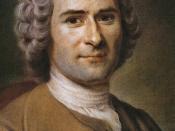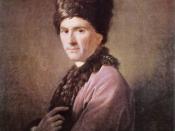Why, according to Rousseau, is the general will always upright and tending to the public advantage?
The central political concept in Jean--Jacques Rousseau's writings was his 'general will' theory; it dominates his work 'The Social Contract'. The general will in society may be coarsely defined as the existence of an objective common good; furthermore the state will express the general will through policies that pursue this common good. In The Social Contract Rousseau wrote 'The general will is upright and always tends to the public advantage; but it does not follow that the deliberations of the people always have the same rectitude. Our will is always for our own good, but we do not always see what that is....' (Rousseau, II.iii). Therefore in Rousseau's own thoughts the individual is self-interested - how does he reconcile his belief in the selfish nature of man and his conviction that the result of successful political community will be an infallible general will? How can everyone in the society pursue one shared goal without losing any autonomy?
Rousseau was the co-founder of the general will principle; it first apperared in his short discourse called 'ÃÂconomie politique' which was an article of the Encyclopedie.
This article was edited by Denis Diderot and a new technical term was introduced to the doctrine of political philosophy. The idea that a political community might have a common interest and to some extent one will was commonplace in the political thinking of the Enlightenment, but more in terms of being the will of all. The sum of all individual pursuits is not however Rousseau's general will, even if all the individuals in society agree on a particular purpose. Rousseau rejects the idea that the sum of all wills represents the general will because he presupposes that this...



Rousseau
You obviously know your stuff! This is an excellant essay where you show good understanding of the subject. It would have been nice to see a few more direct quotes.
3 out of 3 people found this comment useful.